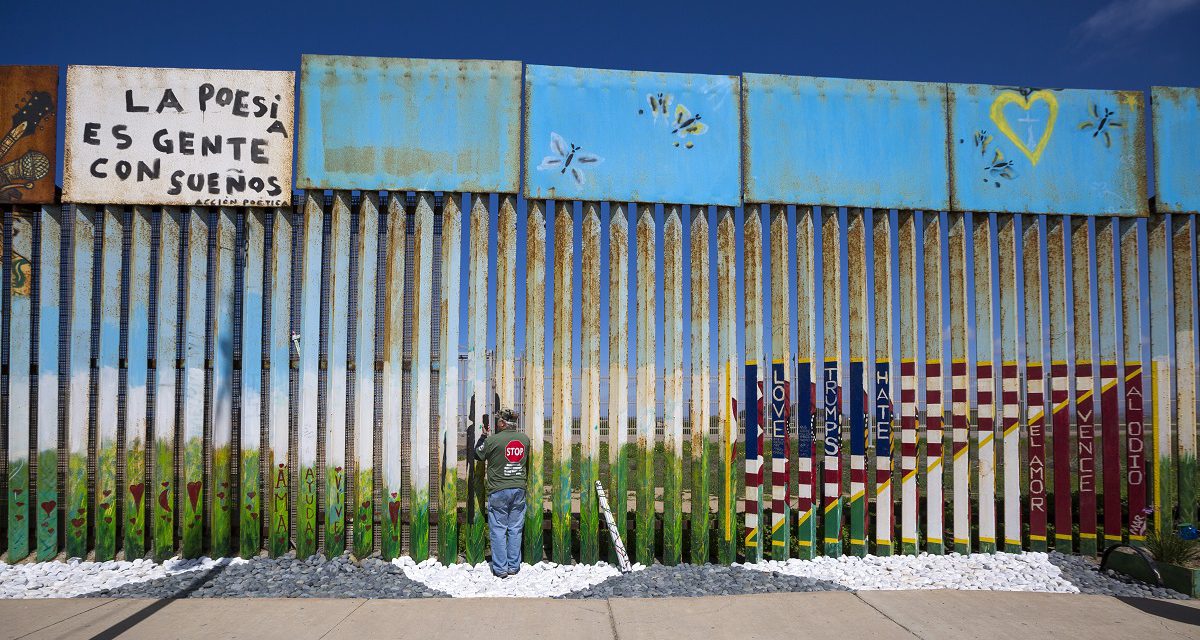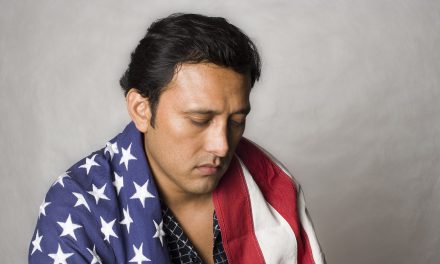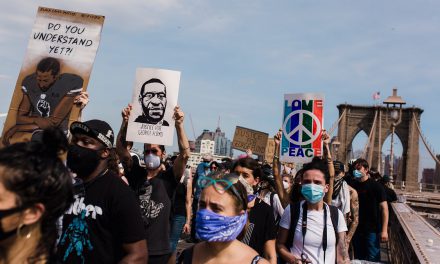As a Mexican American and a part of the Latinx community, U.S. Army Staff Sergeant Josh Morgan felt an obligation to serve at the U.S.-Mexico border. He admits there was an internal conflict trying to convince himself his occupation was honorable even though the immigration process needed to improve. Seeing people detain and separate families at the border is difficult, but he empathetically understands the need to stop individuals who seek to do harm from entering the U.S.
It’s safe to say Morgan has a unique perspective. He grew up in the foster care system, so he’s keenly aware of the traumatic effects of family separation. To that end, his story helps shed light on how family separation is detrimental – whether in America’s foster care system or on the border.
When he was three years old, Morgan and his two-week-old brother were picked up by the Los Angeles Police Department (LAPD) while dumpster diving for food. The two ended up separated and in foster care, with Morgan moving around every six months between Latinx and non-Latinx families. At age five, Morgan and his brother reunited with their tío and tía, happy to again be a part of a Spanish-speaking, catholic Latinx family. However, as they neared the adoption finalization, their tía died of a heart attack and their tío was set to deploy for the Iraq war, sending them back to foster care.
Eventually, Morgan’s current parents heard about him and his brother and adopted them, and shortly after they learned about and adopted several more siblings. While he ended up in a happy, loving, American family, he was diagnosed with Reactive Attachment Disorder, which affects all his relationships, not just romantic or familial, as well as Attention Deficit Hyperactivity Disorder (ADHD) and anxiety. Throughout adolescence and into adulthood, he experienced trouble eating and sleeping as well as anger issues which landed him in a lot of fights.
People separated from family members at a young age suffer long-term traumatic effects, especially when paired with racial trauma Latinx people face throughout their lives. Morgan’s experience in the American foster care system helped him bring an empathetic perspective to his time at the border as well as have a deeper understanding of what families being separated face long-term.
A Day in Border Security
Morgan spent the winter of 2018 through early summer of 2019 patrolling the southeast Texas side of the U.S.-Mexico border, aiding and providing surveillance for Customs and Border Patrol (CBP). According to Morgan, the Army is not responsible for detaining those entering the U.S. illegally. Instead, they provide security and coordinate with CBP, but his specific mission was separate from Immigration and Customs Enforcement (ICE) and did not see past the intake process.
He served in a rural area of southeast Texas essentially working security shifts along hotspots, sometimes farms or areas near fences and checkpoints, where people were likely to come across. He and others were given a script about what they could and could not say when stopping someone, at which point they would call someone to detain the immigrants and pass them along.
As part of providing security, watchmen along the river and the border wall spot people attempting to cross. Some people climb the wall, which he calls more of a long, tall fence, and often fall over and break bones. While immigrants’ safety is a concern, he says whether the border patrol agents prioritize that is a matter of [who] you ask. He was not personally on these locations but has heard debate between watchmen who see their position as a genuine act of service helping people cross safely, and those who see it as a burden to have to use resources or medical supplies in a potentially avoidable situation. “It’s a different world down there,” Morgan said. “It’s a completely different take on how people see social issues.”
Morgan said a lot of people, not necessarily of Mexican heritage, come across seeking sanctuary and voluntarily give themselves up, asking to be arrested just to enter the country. He recalled a mission when he and other agents heard over the radio, “an absurd, heart-wrenching number of people” were crossing the river that night. “Not everyone makes it,” he said, recalling how often families making that journey end up drowning and wash up along the river’s shore. “Hearing that was hard.”
What Happens After Detention
While Morgan spent some time near border detention facilities, he did not officially oversee or have a part in the detention process, but simply was made aware of it. “You get curious and start asking questions and talking to agents who have seen that stuff for years.” As far as he understands, immigrants are taken from where he and others detain them to a waiting room where they are booked into the system, and then given a court date. The booking facilities he saw were standard, but the frequency of people coming certainly caused an overflow. “You never saw it empty, there was never really a slow day.”
His knowledge of the interior of the detention areas where people are kept and abuses and deaths happening within are the same as the average American citizen – what has been reported in media. Having never attended the facilities detainees are held in and having left the area prior to the COVID-19 pandemic, he cannot speak to the conditions detainees face or the safety precautions (or lack thereof) taken in 2020. However, a report by the Detention Watch Network (DWN) titled “Hotbeds of Infection” states that “ICE’s failure to release people from detention during the pandemic added more than 245,000 cases to the total U.S. caseload,” among other horrific findings.
While detained immigrants receive court dates, others sometimes slip through by posing as migrant farm workers or hiding successfully until someone state-side picks them up and helps them through. Even those “let free” with a court date face so many barriers, he said, adding, it isn’t a real solution because there are too many barriers to overcome. For instance, what can they do until the court date? Do they understand the legal process? Do they speak the language? Can they afford an attorney? Do they know where to go for help navigating this process? “Who’s going to show up to that?” Morgan said. “When I know I’m going to court for my individual freedom, I’m not too keen to return to the people who caused that.”
Family Separation at the Border and in Foster Care
“When we talk about a country that is under the mantra of liberty and justice for all – while these people may be entering illegally, a lot of them are desperate, and the process of entering legally is something they don’t necessarily have time for. If they need help, it’s a moral obligation as humans – the humane thing is to provide them with care and with help. To assume that everyone is taking advantage and doesn’t need help — that needs to be reformed as a country.”
Morgan hopes others realize immigrants willingly put themselves and their families through a traumatic process, simply for a chance at sanctuary. “What’s happening to them is not something they’re unaware of,” he said. “They’re not coming to America not expecting to be detained and booked – they know the process and do it anyway. That speaks volumes to the conditions they’ve been living in, knowing that what they’re about to receive is better than that. That’s disheartening.”
While the process obviously needs reform, especially the attention being provided to people who are currently detained, Morgan stressed that there is still good being done. He has personally seen a number of large drug busts of marijuana and fentanyl, a dangerous, synthetic opioid 50-100 times more potent than morphine. Synthetic opioids, and drugs such as marijuana laced with them, are the most common drugs involved in overdose deaths in the U.S.
The large volume of people crossing the border seeking refuge unfortunately provide a cover for those with harmful intentions to exploit. “There are some benefits of having people protect the border, but there are a lot of people coming through you don’t necessarily need protection from. It’s a rough line to walk.” While Morgan did not experience blatant racism throughout his time on the security and protection side of border patrol, he does worry that a “mass grouping ideology” while detaining people in the name of protecting one’s country certainly presents the opportunity. “You’re going to have racists everywhere. If people are offered a chance to have that kind of mentality and it be morally okay, they’re going to take advantage of that.”
The foster care system is similarly exploited with ill-intentioned people, adding to the attachment and trust issues foster children experience. Morgan learned about “hoarders” who foster children for the money but do not provide any substantial care or adequate living conditions. This includes a lack of nutrition, sleeping on air mattresses, overcrowding etc. He also witnessed instances of sexual harassment, sexual assault, and trafficking within the system, along with other abuses. Morgan urges those considering adoption to do so to help the kids who need it, rather than allowing them to fall prey to people taking advantage of their situation.
A Call for Change
Despite the abuse he’s seen, he has also experienced the love and kindness of families who were good to him, such as the one he ended up a part of. “There are people out there who really want to help make a difference. Morgan believes both systems can be reformed with the right people in the right positions. His sense of obligation to defend both his country and his culture allowed him to educate himself and others on immigrants’ experiences. Though he cannot change the detainment process, he helps those seeking sanctuary within a racist system and encourages the same from his peers. In any position of power, understanding others’ experiences, empathizing with them, and advocating for others to do the same dismantles systemic ignorance. One’s dedication to justice creates a ripple effect leading to lasting change.








